Selecting a batch of world well-known photographs is basically advanced however actually enjoyable to do as a result of finding out pictures is, for me, the easiest way to study pictures in its essence. Images, for me, is about capturing significant tales and nothing extra. It’s utterly regular to count on readers to touch upon the inclusion or exclusion of sure pictures.
The aim is to not exclude or embrace however to say world well-known photographs which have been famend as iconic as a result of their social and anthropological significance.
Images is a manner of feeling, of touching, of loving. What you could have caught on movie is captured without end… It remembers little issues, lengthy after you could have forgotten every little thing.
Aaron Siskind
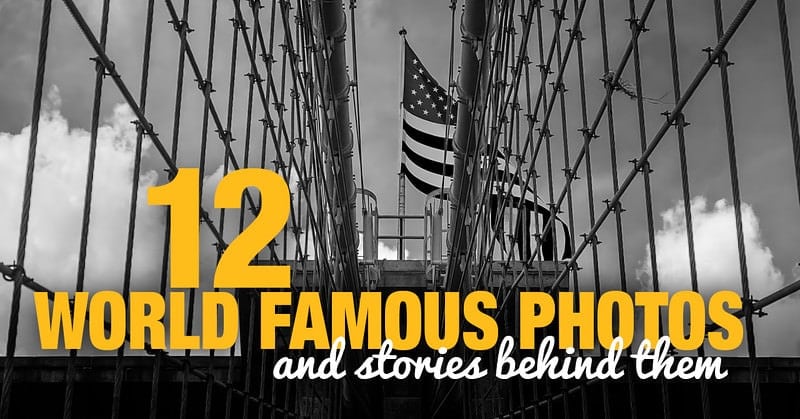

To me, pictures is an artwork of commentary. It’s about discovering one thing attention-grabbing in an odd place… I’ve discovered it has little to do with the belongings you see and every little thing to do with the best way you see them.
Elliott Erwitt
A tear accommodates an ocean. A photographer is conscious of the tiny moments in an individual’s life that reveal larger truths.
Nameless
Get Impressed by World Well-known Images
Please be happy to share different pictures that may very well be thought of as traditionally necessary with the intention to get a richer expertise by means of the social growth of those phrases. With out additional ado, let’s discuss some world well-known photographs.
1. Sharbat Gula – Steve McCurry – 1984
Revealed for the primary time in 1985, the long-lasting portrait of a younger Afghan woman, a refugee from the warfare, nonetheless evokes a deep and sophisticated mixture of emotions and feelings to at the present time. After seventeen years, Steve McCurry discovered her and portrayed her once more.
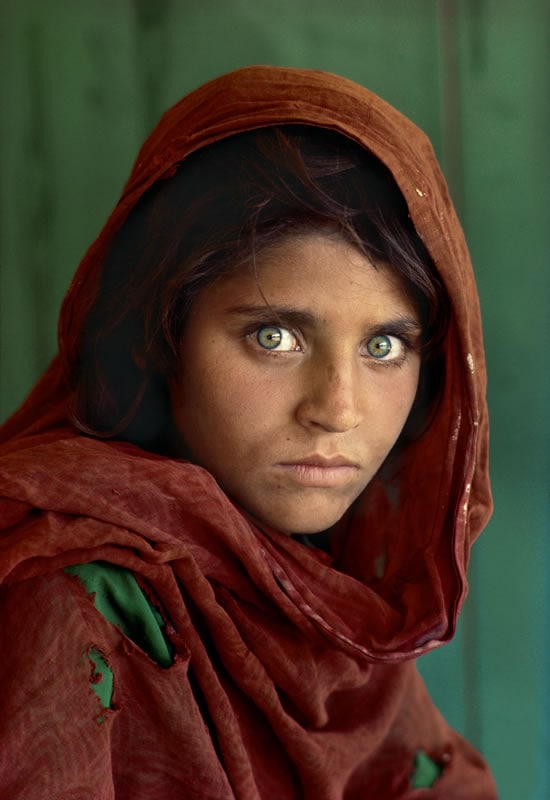

This picture is essentially the most excellent portrait of all time for me. This is because of many components, however the major one is that eerie feeling of indefinite expression (I suppose this is the reason some folks have likened this image to the trendy Mona Lisa).
The second Steve McCurry captured is so intense that I can solely guess that it’s proof of the transition between recognizable feelings. Her stunning inexperienced eyes, her pores and skin, her hair, her fragile garments, the excellent sharpness of the picture, the complementary colours, her soul-piercing look—every little thing on this image speaks.
I keep in mind once I first noticed this picture, I imagined Steve McCurry working on a random road and capturing this picture nearly candidly. Later, I discovered that it wasn’t like that, and it doesn’t matter to me; this portrait is classy and excellent; it speaks to the universality of the human being.
A few years in the past, I watched this video and understood the significance of getting agile and well-intended social abilities with the intention to seize significant footage.
Steve McCurry wasn’t dashing away from bullets like a superhero as portrayed once I first noticed this picture (no less than with photographic consciousness of what it might have implied capturing a picture like this one within the midst of a warfare context). As an alternative, he was at a faculty, and he managed to make her nearly need the image. His abilities have been past wonderful. We regularly have the misperception that children don’t perceive issues and might simply be fooled. However youngsters don’t lie, they usually possess quite a lot of temperament and character, which is clearly tangible within the iconic portrait of Sharbat Gula. And after 17 years, he discovered her once more.
And for the tech-savvy and curious people, he shot this picture with the legendary Kodachrome movie, utilizing a Nikon FM2 and a trusty Nikkor 105mm f/2.5 lens.
2. Falling Soldier – Robert Capa – 1936
Robert Capa gained intensive expertise as a warfare photographer throughout the Spanish Civil Struggle, and it was with this explicit picture that the persona behind Robert Capa garnered international recognition.
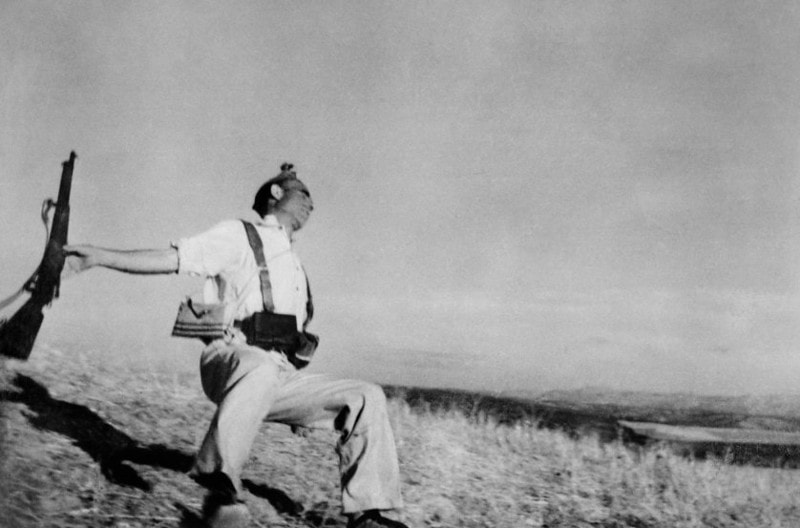

Taken close to Córdoba within the early months of the warfare, the {photograph} captures a soldier struck by a bullet. It made its debut within the twenty third challenge of the French journal Vu and shortly grew to become an iconic illustration of the battle, broadly reprinted, and probably the most well-known warfare pictures in historical past. Simply two years after this image was printed, the British journal Image Put up hailed the 25-year-old photographer because the world’s finest warfare photographer.
Capa’s audacious method to capturing the picture can also be noteworthy. He was identified for his fearless and intimate fashion of warfare pictures, usually putting himself remarkably near the guts of the motion. Within the case of this picture, he reportedly embedded himself with the troopers on the entrance traces, capturing the uncooked and quick essence of the battle.
The controversy surrounding “Falling Soldier” facilities on its authenticity. Over time, there was ongoing debate and skepticism relating to whether or not the {photograph} was staged or genuinely captured within the warmth of battle. Some critics argue that the picture could have been posed, whereas others keep that it authentically portrays a soldier within the midst of fight. No matter these controversies, the picture endures as a strong and lasting image of the Spanish Civil Struggle and the tough realities of armed battle.
The picture depicts the soldier’s rifle falling alongside the soldier’s physique because it crumples to the bottom, conveying the fragility and the suddenness with which loss of life can overtake a human being.
3. Migrant Mom – Dorothea Lange – 1936
“Migrant Mom from Nipomo,” {a photograph} taken by Dorothea Lange in her residence state of California, stands as an emblematic icon depicting the tough realities endured by Individuals throughout the Nice Despair of the Thirties. This picture is arguably essentially the most well-known from the undertaking commissioned by the Farm Safety Administration, geared toward capturing the profound affect of the Nice Despair on American households.
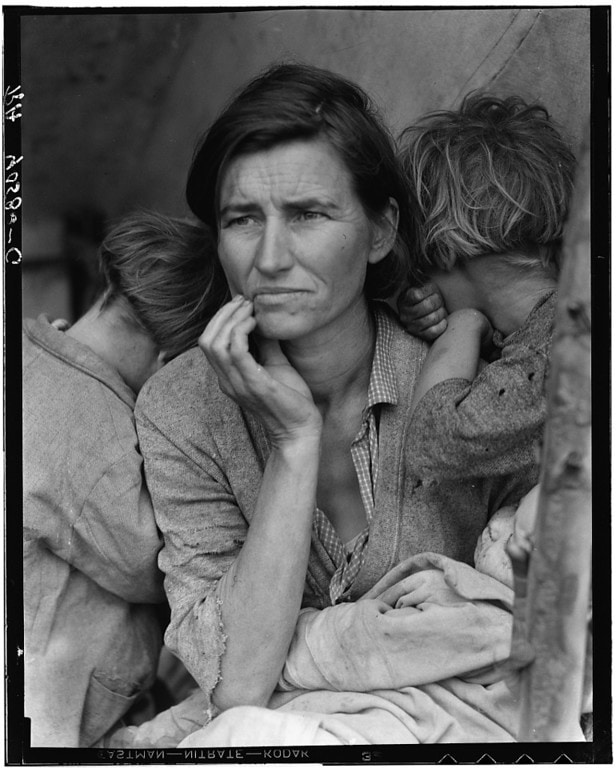

Dorothea Lange defined that she encountered this girl whereas engaged on the journalistic undertaking. The topic was a mom of seven youngsters, and it took as little as ten minutes to seize their second. The picture authentically portrays a fleeting second in time.
This {photograph} serves because the archetype representing the victims of financial hardship, with the preliminary deal with one particular person. Apparently, Dorothea Lange didn’t disclose the identify of the girl, and it wasn’t till many years later that she was recognized as Florence Owens Thompson, a resident of the Cherokee territories in Oklahoma at the moment. The photographer’s choice to withhold the identify provides complexity to the position of a photojournalist in documentary work. Nonetheless, I imagine she acknowledged the picture’s significance as an archetype, rendering the identify pointless. Quite the opposite, Florence Owens Thompson later expressed discomfort together with her picture being the enduring image of poverty. Remarkably, the picture can also be part of MoMA’s assortment.
Once we research the picture, Florence is undeniably the central focus. Lange had a fascination with palms as symbols of the onerous work that many individuals endured for his or her livelihoods, and on this {photograph}, the palms convey an added layer of concern. Notably, the picture options three youngsters: two youngsters are positioned on both facet of Florence, whereas a vulnerable-looking child is located within the heart, surrounded by the tough realities of the Nice Despair.
In essence, the punctum of the picture is the concern evident in Florence’s eyes and palms, whereas the studium of the picture encapsulates the difficult context of elevating a big household amidst the struggles of the despair.
4. Hyeres – Henri Cartier-Bresson – 1932
Cartier-Bresson was famend for his unyielding method of not cropping his pictures and presenting them precisely as they have been framed in-camera. He ceaselessly expounded on the idea of the “Decisive Second,” which might be succinctly outlined as the flexibility to seize a second simply earlier than it unfolds.


Whereas I can’t recall the precise supply, I distinctly keep in mind him saying that if you happen to had already seen the second, it had already transpired, and as a photographer, one should possess the foresight to understand the second earlier than it materializes.
The picture generally known as “Hyères” by Cartier-Bresson serves as an exemplary illustration for comprehending composition. All through the {photograph}, we encounter the rule of thirds, notably evident on the bicycle rider, in addition to main traces which are prevalent in all places, from the sidewalk to the conspicuous swirl on the handrail of the steps. Moreover, the utilization of a gradual shutter pace imparts a profound sense of motion and dynamism to the rider as they exit the scene.
This {photograph} was captured in Hyères in 1932 and has stood the check of time as an iconic illustration of Henri Cartier-Bresson’s work, usually featured in varied retrospectives. The Decisive Second is strikingly evident right here, skillfully juxtaposing the rider’s freedom with the unyielding construction of the balcony and the railings.
Whereas the picture could appear nearly unintentional, because of Cartier-Bresson’s concept of the Decisive Second, the chances of reaching the meant consequence have been decidedly in his favor. It’s additionally conceivable that this shot resulted from a affected person wait, a vital facet of pictures that ought to by no means be underestimated.
5. Steve Jobs – Albert Watson – 2011
The enduring portrait of Steve Jobs, taken by Albert Watson, completely encapsulates his legacy. Quickly after his passing, this portrait adorned the touchdown web page of apple.com, making it probably the most important pictures of our time. Watson used a 4×5 digicam, which provides an ironic twist to the portrait of such an revolutionary particular person.


Technical particulars apart, the picture’s energy lies in its simplicity, focusing solely on Jobs. His hand pose suggests fixed contemplation, whereas the delicate smile radiates vitality and confidence. The black and white alternative eliminates distractions, permitting Jobs’ piercing gaze to interact viewers.
This {photograph} has turn out to be universally recognizable, swiftly reaching iconic standing because it circled the globe. Albert Watson’s 2006 portrait captures Steve Jobs in a contemplative and enigmatic pose, emphasizing his mental depth and visionary management within the tech business. The meticulous consideration to lighting and composition highlights Jobs’ charisma and presence in opposition to a minimalist background.
This picture is very important as a result of it portrays Jobs throughout a pivotal interval in his profession, as he led Apple by means of groundbreaking product releases just like the iPhone and MacBook. It serves as an enduring tribute to Jobs, symbolizing his position as a technological pioneer and an emblem of innovation and artistic imaginative and prescient. It’s a strong reminder of the profound affect one particular person can have on the world by means of their concepts and dedication.
6. Lunchtime atop a Skyscraper – Charles C. Ebbets – 1932
“Lunchtime atop a Skyscraper,” captured by Charles C. Ebbets in 1932, is a well-known {photograph} that has come to represent the indomitable spirit of American employees throughout the Nice Despair and the development of iconic skyscrapers, particularly the 30 Rockefeller Plaza in Manhattan.
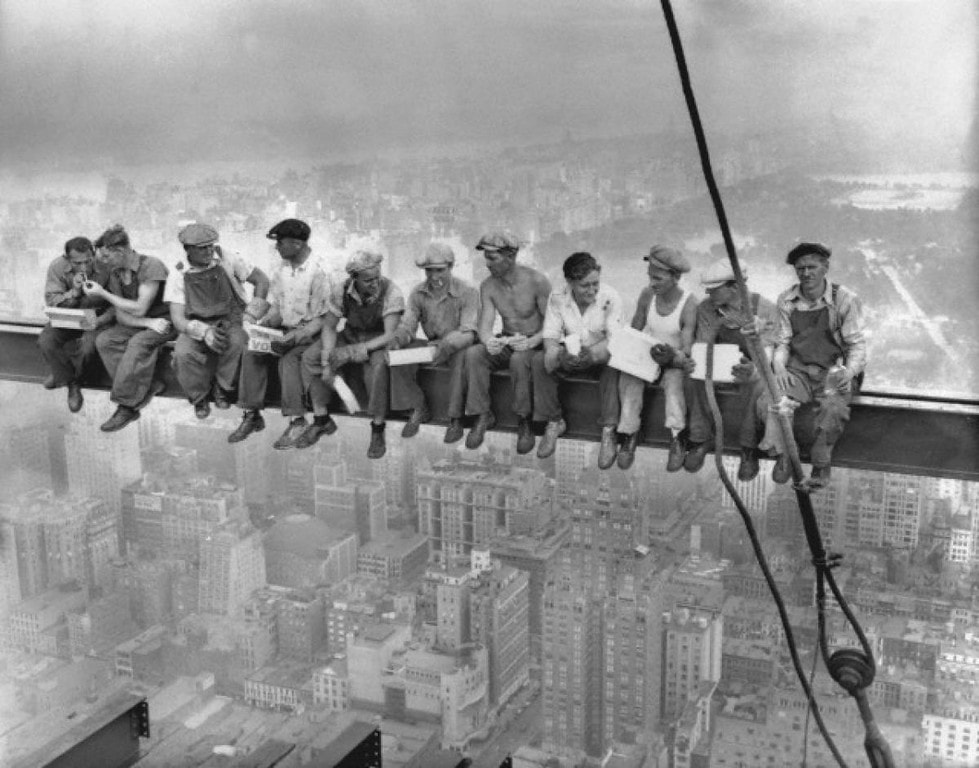

The importance of this {photograph} lies in its portrayal of the brave development employees who risked their lives day by day whereas constructing the towering skyscrapers that outlined the New York Metropolis skyline. In a seemingly precarious and breathtaking scene, 11 development employees nonchalantly sit on a metal beam excessive above town streets. Some eat their lunches, whereas others relaxation, all with their legs dangling over the sting. It serves as a potent image of American resilience, grit, and dedication within the face of adversity.
Ebbets’ {photograph} was taken on the 69th ground of the GE Constructing throughout the development of the Rockefeller Heart. He used a large-format digicam to seize this exceptional second, which provides to the picture’s readability and sharpness.
Controversy has surrounded the {photograph} relating to the identities of the employees and the authenticity of the scene. For a few years, the identities of the employees remained unknown, main to varied claims and debates about their true identities. Furthermore, some critics raised questions on whether or not the {photograph} was staged or a spontaneous seize of an actual second.
No matter these controversies, “Lunchtime atop a Skyscraper” stays a permanent image of the American can-do spirit, the daring of development employees, and the development increase of the twentieth century.
7. V-J Day in Instances Sq. – Alfred Eisenstaedt – 1945
It’s becoming that the picture marking the top of World Struggle II was created by the palms and eyes of a Jewish photographer. On this picture, we witness a strong second the place two of essentially the most iconic symbols of the warfare come collectively in a profound and passionate kiss.


The {photograph}’s topics, later recognized as George Mendonsa, the sailor, and Greta Zimmer Friedman, the nurse, embody the enjoyment, aid, and pleasure that surged by means of the nation upon listening to the information of the warfare’s finish.
These two symbols symbolize not solely the people concerned but in addition function the nameless representatives of the numerous sailors and nurses who tirelessly labored throughout the warfare. Each of those teams performed pivotal roles in upholding the USA’ power all through the horrors of the battle. The celebration captured on this {photograph} signifies the conclusion of a violent and bloody chapter in trendy historical past, taken in Instances Sq., New York Metropolis.
Their identities remained unknown for a while, however finally, George and Greta have been acknowledged as the long-lasting figures on this historic {photograph}.
One other picture, taken from a barely totally different angle, is price noting. Nonetheless, the long-lasting one, most probably as a result of its perspective and composition, is the shot by Alfred Eisenstaedt. However, the less-known picture by Victor Jorgensen additionally holds its personal by encapsulating the essence of this monumental second within the Struggle.
This picture purposefully blurs the excellence between the 2 faces throughout the body, reinforcing the importance of those symbolic figures.
8. Einstein’s Birthday – Arthur Sasse – 1951
Also known as “Einstein’s Tongue,” this picture has achieved iconic standing because of its playful and humorous character. Humor, in itself, calls for a level of intelligence, and capturing humor in candid pictures is among the many most difficult elements of this self-discipline. The {photograph} provides a distinct perspective on Albert Einstein, revealing a facet of him that’s lighthearted and a contact eccentric, which contributes to its greatness.


This memorable second unfolded throughout the 72nd birthday celebration of Albert Einstein, an event attended by quite a few photographers. Nonetheless, it was Jean Sasse who managed to seize the shot that might turn out to be iconic. On this picture, we’re offered with a facet of Albert Einstein that’s each relatable and endearing, a departure from the Nobel prize-winning physicist famend for his concept of normal relativity.
What provides an intriguing layer to the picture’s background is that Einstein was so keen on it that he requested the UPI (United Press Worldwide) to supply him with 9 copies of the cropped picture for his private use. One among these copies discovered its solution to Howard Ok. Smith, a good friend of Einstein. Apparently, a short message adorns the again of the picture, which reads, “This gesture you’ll like as a result of it’s geared toward all of humanity. A civilian can afford to do what no diplomat would dare.“
9. Guerrillero Heroico – Alberto Korda – 1960
Very like V-J Day was fittingly captured by a Jewish photographer, the scene of Ernesto “Che” Guevara feels appropriately captured by a Cuban lens. Whereas Guevara was Argentinian, his shut friendship with Fidel Castro establishes a major connection to the Cuban perspective. The picture, certainly, was taken by a Cuban, Alberto Diaz Gutierrez, generally known as Alberto Korda, who served as Fidel Castro’s official photographer for 9 years and accompanied him on quite a few worldwide journeys.


Ernesto “Che” Guevara was the topic of assorted exceptional pictures, together with the one taken by Rene Burri. Nonetheless, the one that almost all enduringly immortalizes his heroic persona is Korda’s, with no shadow of a doubt. This picture has been broadly disseminated, adorning flags, t-shirts, and stickers. The story behind this iconic picture is equally compelling. On March 4, 1960, the French freight ship La Coubre was transporting weapons from Belgium to Cuba to help Castro’s regime when it exploded, with Castro alleging U.S. involvement.
The tragic incident claimed the lives of over 75 people, and the next day, a solemn funeral was held in Havana. Whereas audio system delivered their eulogies, Alberto Korda captured two candid pictures of Guevara. Unbeknownst to Guevara on the time, these pictures advanced to turn out to be not merely iconic however profoundly symbolic.
Apparently, Alberto Korda was by no means content material with the industrial use of the picture because it contradicted Che’s personal beliefs, the very beliefs he had sacrificed his life for.
10. Normal Nguyen Ngoc Mortgage Executing a Viet Cong Prisoner – Eddie Adams – 1968
It’s been mentioned that no different group of photojournalists had the liberty to doc the horrors of warfare fairly like those that roamed the brutal landscapes of the Vietnam Struggle. Right here, we confront probably the most harrowing pictures ever captured by a photographer, a picture that earned Eddie Adams the Pulitzer Prize in 1969.


In a transient video, Eddie Adams himself explains the sequence of occasions. It appears like the real and quick response of a devoted photographer. He witnessed the officer elevating his gun and instinctively raised his digicam. The ensuing picture attained iconic standing nearly instantaneously and stands as a stark testomony to the horrors of warfare.
This {photograph}, past a shadow of a doubt, stands as essentially the most iconic picture of the Vietnam Struggle. Its energy lies in its proximity to the exact second one man takes one other man’s life. The uniformed South Vietnamese officer coldly executes a prisoner with a gunshot to the pinnacle, and the brutality of that immediate acquired immortalized by means of the lens of pictures. This exemplifies the profound significance of photojournalism: it permits us to recollect moments that we hope won’t ever be repeated.
11. The Mahatma – By Margaret Bourke – 1946
Margaret Bourke-White’s {photograph} of Mahatma Gandhi, titled “The Mahatma,” is an iconic picture that profoundly symbolizes the life and philosophy of this nice chief of nonviolent resistance throughout India’s battle for independence. Captured in 1946, the {photograph} portrays Gandhi at his spinning wheel, serving as a potent image of his dedication to self-sufficiency and nonviolent resistance.


The backstory of this {photograph} is each charming and symbolically wealthy. Margaret Bourke-White, one of many privileged few to {photograph} Mahatma Gandhi, frolicked with him at his ashram in India. When she tried to seize the picture with Gandhi close to the spinning wheel, his secretaries intervened and insisted that if she needed to create a picture with that exact composition, she wanted to discover ways to function a spinning wheel herself.
Gandhi’s apparel on this {photograph}, characterised by a standard dhoti and scarf, displays his unwavering dedication to simplicity and his rejection of materialism. “The Mahatma” by Margaret Bourke-White transcends being only a portrait; it stands as a strong illustration of Gandhi’s peaceable resistance and steadfast devotion to the ideas of reality and nonviolence. Over time, it has turn out to be a permanent image of his legacy and the beliefs he championed throughout India’s battle for independence.
LIFE journal’s first girl photographer was in India in 1946, overlaying the Indian independence course of.
12. Tank Man – Jeff Widener – 1989
The well-known {photograph} titled “Tank Man,” captured by Jeff Widener throughout the 1989 Tiananmen Sq. protests in Beijing, holds a profound and iconic significance. It symbolizes the indomitable spirit of a person dealing with authoritarianism and oppression.


Story Behind It: This poignant picture was taken on June 5, 1989, only a day after the Chinese language authorities had dispatched troops and tanks to brutally suppress the pro-democracy demonstrations in Tiananmen Sq.. The aftermath of the federal government’s crackdown had left the sq. in disarray, strewn with particles and destruction.
Jeff Widener, an Related Press (AP) photographer, was in Beijing to cowl the unfolding protests. He acquired a tip that one thing was occurring at Tiananmen Sq., though it had been sealed off to the press. Widener, accompanied by a small group of journalists, ventured to the Beijing Lodge, which supplied an elevated view of the sq..
From a fifth-floor balcony, Widener had an unobstructed view of the sq.. It was from this vantage level that he captured the long-lasting picture of an unidentified Chinese language man standing boldly in entrance of a line of tanks, stopping their advance.
The id of “Tank Man” stays unknown, because the Chinese language authorities has stored a decent grip on data relating to the protests and their penalties.
How It Was Taken: Jeff Widener employed a Nikon FE2 digicam geared up with a 300mm telephoto lens to seize the picture. The bodily distance between the photographer and the scene emphasised the stark juxtaposition between the solitary particular person and the formidable army equipment he confronted.
Widener’s {photograph} quickly gained worldwide recognition, turning into a permanent image of the battle for human rights and freedom in opposition to oppressive regimes. It has etched an enduring impression within the collective reminiscence of the Tiananmen Sq. protests and continues to function a potent and timeless illustration of particular person braveness within the face of tyranny and oppression.
World Well-known Images | Conclusion
In conclusion, these twelve photographs are among the world’s most well-known and well-known pictures. Each has an attention-grabbing story that helps add context and depth to the picture. These tales present a glimpse into totally different cultures and historic moments and assist us higher perceive the world round us.

